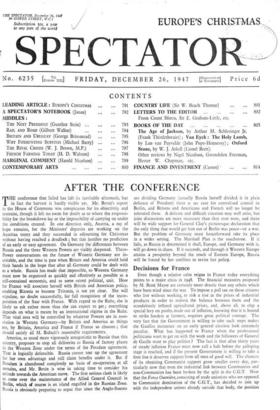AFTER THE CONFERENCE
THE conference that failed has left its inevitable aftermath, but in fact the harvest is hardly visible yet. Mr. Bevin's report to the House of Commons was conspicuous for its objectivity and restraint, though it left no room for doubt as to where the responsi- bility for the breakdown lay or the impossibility of carrying on under the conditions created. In one direction only, Austria, a ray of hope remains, for the Ministers' deputies are working on the Austrian treaty and they succeeded in adjourning for Christmas without having reached a deadlock ; but that justifies no prediction of an early or easy agreement. On Germany the differences between Russia and the three Western Powers are visibly deepened. Three- Power conversations on the future of Western Germany are in- evitable, and the time is past when Britain and America could hold their hands in the hope that after all Germany could be dealt with as a whole. Russia has made that impossible, so Western Germany must now be organised as quickly and effectively as possible as a self-contained economic, and to some extent political, unit. How far France will associate herself with British and American policy, enabling Bizonia to become Trizonia, is not yet clear. She will stipulate, no doubt successfully, for full recognition of the incor- poration of the Saar with France. With regard to the Ruhr, she is likely to ask rather more than she can expect to get ; everything depends on what is meant by an international regime in the Ruhr. That vital area will be controlled by whatever Powers are in asso- ciation in Western Germany—by Britain and America as things are, by Britain, America and France if France so chooses ; that should satisfy all M. Bidault's reasonable requirements.
America, as usual more vigorously antagonistic to Russia than this country, proposes to stop all deliveries to Russia of factory plants in the Western Zone under the terms of the Potsdam agreement. That is logically defensible. Russia cannot tear up the agreement for her own advantage and still claim benefits under it. But if Potsdam is abandoned completely no basis of co-operation at all remains, and Mr. Bevin is wise in taking time to consider his attitude towards the American move. The first serious clash is likely to come over the maintenance of the Allied Control Council in Berlin, which of course is an island engulfed in the Russian Zone. Russia is obviously preparing to argue that since the Anglo-Saxons
are dividing Germany (actually Russia herself divided it in plain defiance of Potsdam) there is no case for centralised control in Berlin, and Britons and Americans and French will no longer be tolerated there. A delicate and difficult situation may well arise, but joint discussions are more necessary than they ever were, and there will be wide support for General Clay's picturesque declaration that the only thing that would get him out of Berlin was peace—or a war. But the problem of Germany must henceforward take its place in a wider setting. The Marshall Plan is the touchstone. If it fails, as Russia is determined it shall, Europe, and Germany with it, will go down in chaos. If it succeeds, and through it Western Europe attains a prosperity beyond the reach of Eastern Europe, Russia will be forced by her satellites to revise her policy.






























